
You’d Be Stupid Not to Edit – The Harsh Truth About Why Your Podcast Isn’t Growing
Raw recordings don’t convert. Editing is where shows grow. See how our editing bundles and monthly plans turn chaos into a compelling, sponsor‑ready show.
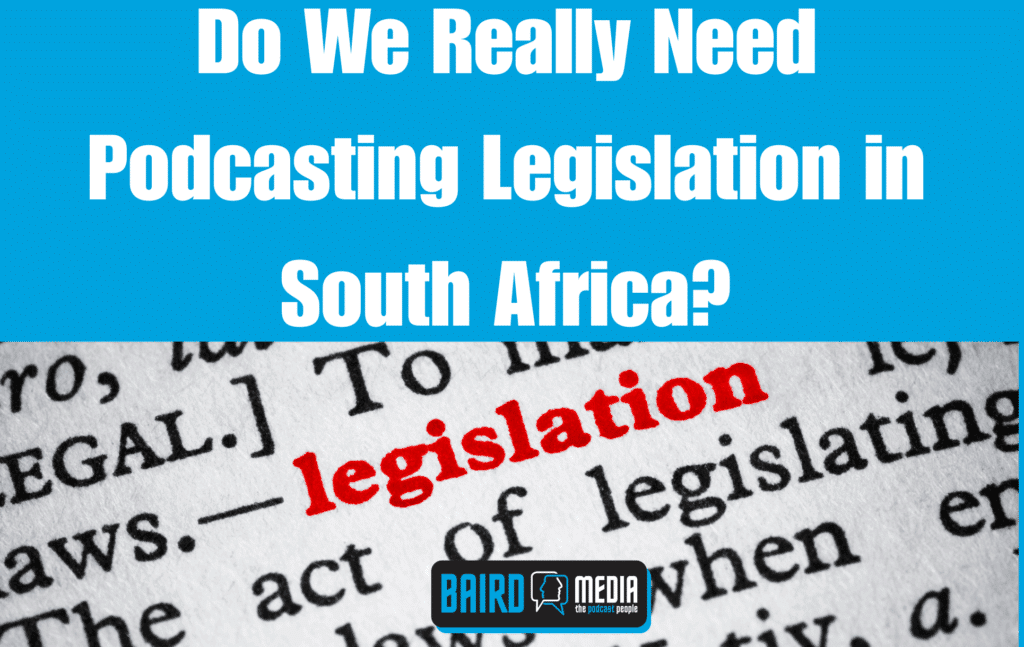
The Department of Communications and Digital Technologies has released a Draft White Paper on Audio and Audiovisual Media Services and Online Safety. At first glance, it sounds like the kind of serious policy document only media lawyers would read for fun. But buried in its 90-odd pages is something that affects me, and probably you too if you produce or listen to podcasts in South Africa.
It’s the first time our government is making a real attempt to regulate the digital audio space. And let’s be clear. This is not just about Netflix and YouTube anymore. Podcasting, my chosen medium, is now very much in the crosshairs.
Now, I’m no conspiracy theorist. I understand the need for thoughtful regulation. The internet isn’t the wild west it once was, and some measure of oversight makes sense. But I also know how things work in this country. We’re very good at writing policies. Not always so great at implementing them.
So the question becomes: do we really need legislation for podcasting in South Africa? And if we do, what kind of legislation would actually serve the public without strangling the very creativity we’re trying to encourage?
Let’s unpack it.
The White Paper sets out noble goals. It wants to protect children, promote local content, ensure fair competition, and modernise outdated broadcasting laws that were designed in the analogue age. It recognises that streaming services, on-demand audio, and user-generated content have disrupted the entire media landscape. Good. About time.
It also wants to introduce a risk-based, tiered regulatory system. That means larger players like Netflix or Spotify might face stricter rules, while smaller or non-commercial creators would (in theory) be treated more leniently. Again, the intention here is sound.
But here’s where it gets muddy. The White Paper uses terms like “on-demand content services” and “broadcasting-like services” without clearly explaining where podcasting fits in. It never mentions the word podcast. Not once. And in policy, what’s not said can be just as dangerous as what is.
Without a clear definition, we’re left guessing. Will podcasters need to register with ICASA? Will we be subject to content classification rules? Will independent producers be expected to contribute to a local content fund, like commercial broadcasters? These are not small questions.
Let’s not kid ourselves. The timing of this legislation is no coincidence. The recent MacG scandal, where offensive remarks sparked public outrage and sponsor pull-outs, has likely accelerated the Department’s urgency.
MacG isn’t the first podcaster to stir up controversy, and he won’t be the last. The nature of the medium is intimate, uncensored, and often unpredictable. But the fallout raised a question government can’t ignore: what happens when podcasters cross the line?
It’s a fair question. But the wrong kind of response could do more harm than good.
If this legislation is a knee-jerk reaction to one high-profile incident, it risks punishing an entire industry for the actions of a few. We’ve seen this before. One controversy leads to a heavy-handed policy. Then that policy either sits dormant, forgotten, or becomes a tool to silence dissent.
South Africa is drowning in laws that look great on paper but never come to life. We legislate everything from environmental justice to inclusive media. But follow the paper trail, and you’ll find countless regulations that are underfunded, mismanaged, or simply ignored.
Look at the Universal Service and Access Fund. Or the many provisions around digital literacy, media development, and community broadcasting that have yet to materialise in any meaningful way.
The danger with this White Paper is that it could become another performative gesture. A box ticked. A press release issued. And then nothing. Or worse, it gets implemented unevenly, where certain voices get policed while others slip through the cracks.
We don’t need that kind of policy. We’ve had enough of it.
Now, I don’t want to throw the baby out with the bathwater. I’m not arguing for a free-for-all.
Podcasting, like any powerful medium, has influence. It can educate, entertain, mislead, radicalise, or inspire. That means it carries responsibility.
As someone who has trained dozens of creators across the country, I’ve seen first-hand how little awareness there is about ethical content production. Many creators don’t know where the legal boundaries lie. They’re unaware of what constitutes defamation, hate speech, or harmful misinformation.
Regulation, if done right, could help. It could set clear boundaries without limiting expression. It could protect listeners without punishing creators. It could even raise the credibility of our industry.
But here’s the catch. That kind of regulation has to be done with us, not to us.
A good regulatory framework would start by defining podcasting. Not as a threat. But as a legitimate, emerging media format with unique characteristics. It’s not radio. It’s not YouTube. It sits somewhere in between.
It would then distinguish between different types of creators. Someone making a passion project in their garage should not face the same compliance requirements as a Spotify original backed by a corporate budget.
It would invest in education and training. Give podcasters tools to understand their responsibilities before reaching for sanctions.
It would recognise podcasting as part of the broader creative economy, worthy of support, funding, and skills development.
And it would create a clear, fair complaints mechanism. One that upholds freedom of expression while giving listeners meaningful recourse when genuine harm is done.
Most importantly, it would be shaped in consultation with the people who actually make podcasts. Not just broadcasters and telecoms giants.
What frustrates me the most is that podcasting could be a tool for cultural transformation in South Africa. It’s cheap to produce, easy to access, and capable of reaching people in their own languages, at their own pace. It can uplift stories from rural communities, amplify marginalised voices, and preserve oral histories that would otherwise be lost.
But instead of being nurtured, it’s now at risk of being over-policed or ignored entirely. The White Paper is a chance to get things right. But only if we acknowledge that podcasting is not just content. It’s cultural infrastructure.
That’s why I submitted formal comments to the Department. I urged them to define podcasting clearly. To protect small creators. To involve the South African Podcasters Guild and other stakeholders in the development of codes of conduct. To recognise the potential of this medium, not just its risks.
Whether those suggestions are taken seriously is anyone’s guess. But I believe it’s worth trying. Silence, after all, is also a response.
So, do we need legislation for podcasting?
Yes, but not the kind that gets shelved or misused.
We need policy that helps this industry grow up without clipping its wings. We need regulation that empowers, not punishes. We need clarity, not confusion. And we need to be part of the conversation.
Because if we’re not, someone else will write the rules for us.
And chances are, they won’t even know how to press record.
Your voice is your brand. Your podcast should sound like it.
We help creators, coaches, and businesses make shows that stand out – for the right reasons.
Book a free consultation and let’s build something powerful.

Raw recordings don’t convert. Editing is where shows grow. See how our editing bundles and monthly plans turn chaos into a compelling, sponsor‑ready show.
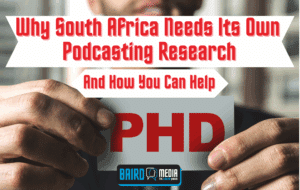
Most podcasting research comes from the US and Europe, ignoring South Africa’s unique challenges and opportunities.
This new PhD study will gather real data from local indie podcasters to help grow the industry, advocate for support, and guide future development.
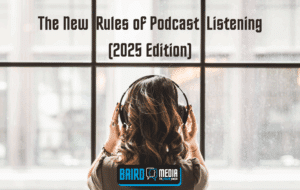
Podcast listening has changed dramatically since the commute-driven days of the 2010s. In 2025, it’s a screen-friendly, all-day, at-home habit—shaped by remote work, video, and a broader, more engaged audience.
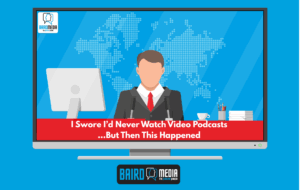
A personal and slightly painful confession from a lifelong audio purist who’s slowly being seduced by the world of YouTube podcasts. This article explores the blurry line between audio and video, and why even the most stubborn podcasters (yes, like me) might need to rethink their stance.

In this article, I explore whether South Africa truly needs legislation for podcasting, reflecting on the intent behind the 2025 Draft White Paper and its potential pitfalls. I argue for thoughtful, inclusive regulation that protects creative freedom while supporting the growth of an emerging industry.
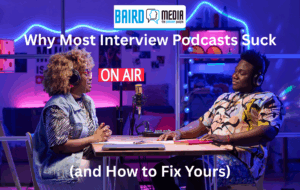
In this brutally honest (and slightly sarcastic) breakdown, I unpack why most interview podcasts fail and exactly how to fix yours. From lazy questions to rambling intros, weak editing to forgettable guests, this is your no-fluff guide to making interviews worth listening to.
© Baird Media 2025